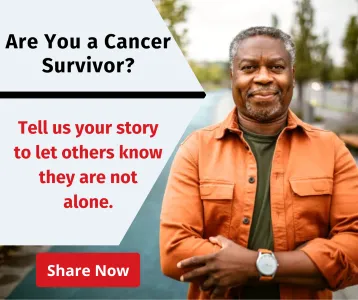Living on Purpose: Cancer Survivor Amber Havekost Shares Her Journey

Editor's Note: This is part of our Survivorship series. Please see other posts in this series.
Amber Havekost wears many hats in life — mother, wife, survivorship coach, and avid writer. Amber is also a cancer survivor. In August 2017, she was diagnosed with advanced stage breast cancer. After her diagnosis, Amber found connection and support through the Cancer Support Community’s MyLifeLine. MyLifeLine is an online community where cancer patients and survivors can build a private support website, share their experiences with their friends and family, and find hope and inspiration on a variety of discussion boards.
On her private support website and elsewhere, Amber has written for hundreds of days straight, from diagnosis to present, documenting her journey to find purpose in the chaos.
In this Q&A, Amber shares her survivorship story with us. In turn, she offers survivors everywhere some words of wisdom, comfort, hope, and inspiration.
How do you personally define “cancer survivorship”?
Survivorship is this strange place where the directives to survive stop and the options to live begin. But everything is upside down, inside out, backwards even, from what is remembered from “before.”
I’m the same person, but actually not. I am 100% changed. My burden of knowledge is heavy because I’m on the inside of that dreaded “C” word. I’ve touched death, but it didn’t take me. My perspective is now simultaneously vastly wide and laser focused. At the start of all of this, surviving meant “not dying.” Now, it means “living on purpose.”

What is one of the toughest challenges of survivorship, and how do you manage it?
Misunderstood grief. In general, we associate grief with death. While they do certainly go together, there are so many non-death losses that are just as permanent and very uniquely painful. Cancer brutally takes so much, and grieving those losses is literally infused in every minute. Unfortunately, because this is such a misunderstood grief, it is often judged as selfish or ungrateful. That couldn’t be further from the truth.
How do I manage this? I choose to be relentlessly authentic. With that comes a willingness to speak up through my interactions with others and in my daily blog. Finding words to articulate my experience helps both me and others understand the complexities of survivorship.
“At the start of all of this, surviving meant ‘not dying.’ Now, it means ‘living on purpose.’”
When talking about life, you use the metaphor of sailing: “The exhilarating adventures, the devastating storms, the sailor adjusting their sails and sailing on purpose.” How does this apply to survivorship?
As the metaphor goes, survivorship feels like I’m in the middle of an uncharted ocean. Some days are calm. Most days are choppy and unpredictable. Of course, there are the out-of-nowhere gales — follow-up appointments, anniversaries, triggered memories — that whip up and threaten capsize. But I believe that all of it matters. All of it teaches me how to adjust my sails so I can sail, or live, on purpose.
Practically speaking, what does that look like?
Adjusting my sails = Living in significant grace, being committed to the idea that I always have something to learn.
Sailing on purpose = Living changed and living present, actively choosing to make it all matter.
“In general, we associate grief with death. While they do certainly go together, there are so many non-death losses that are just as permanent and very uniquely painful.”
You have spoken about the “grace of survivorship.” Can you explain what this means to you?
It can be summed up by 3 words: Simply show up. The year 2017 was marked by one trauma after another. January. April. June. July. Then, on Aug. 18, I got in a huge car accident where — a second later — a semi would have killed me. A short 10 days later came “the call.” As soon as I hung up, I thought to myself, “Why did I barely survive a literal semi just to be killed by this figurative one?” Fast forward into my fourth round of chemo, where I really started to understand the value of simply showing up: Show up for these 5 minutes and do my best whether the next 5 minutes comes or not.
This lesson now guides me in survivorship: The grace to simply show up and be in the footprints I’m in rather than rush or wish to be somewhere else. Here, even if dreadfully hard, has value. Here has something to teach me. Here, there is freedom to live fully.
What is one piece of advice you’d like to share with other survivors — something you’ve learned along the way?
In the diagnosis, in the battle, in the surviving, don’t be afraid to sit with it. To allow the quiet to speak. To choose presence. To give it purpose. To let it change you. It. All. Matters.
“As deep as my pain goes, so does my gratitude, not one replacing the other, but both existing together.”
What is one of the greatest gifts you’re discovering in your survivorship?
Literally, all of this: the story, the grace, the present, the purpose, the perspective, the transformation.
What is one last thought you’d like to leave with us and other survivors today?
We are often cornered by the “either-or,” but cancer has been teaching me to choose the “both+and” instead. One example: As deep as my pain goes, so does my gratitude, not one replacing the other, but both existing together. Take some time to name your own “both+ands” and be inspired by the hope they give you.
* * *
Learn more about Amber and her story on her website, The Purposed Sailor, LLC.